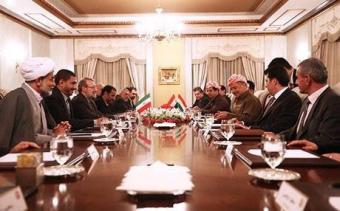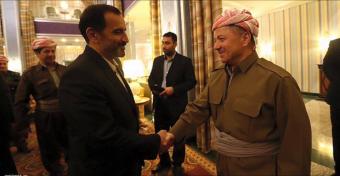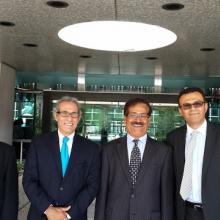Iraqi Kurds’ Double Standard on Terrorism
 The Iraqi Kurdish leadership often prides itself on being in the forefront of the fight against terrorism. This status was well attested following the recent surge of Islamist militants to their south, infamously known as the Islamic State (ISIS). They proved themselves as willing and capable, which consequently led to unprecedented international support and recognition. However, they have displayed little desire to counter the threat of terrorism emanating from the east of their semi-independent region, the Islamic state in Iran.
The Iraqi Kurdish leadership often prides itself on being in the forefront of the fight against terrorism. This status was well attested following the recent surge of Islamist militants to their south, infamously known as the Islamic State (ISIS). They proved themselves as willing and capable, which consequently led to unprecedented international support and recognition. However, they have displayed little desire to counter the threat of terrorism emanating from the east of their semi-independent region, the Islamic state in Iran.
Having a sizable Kurdish community of its own, the Islamic state in Iran has always viewed the Kurdish region in Iraq as a security threat. Iran’s Kurdish region is still under emergency rule of the Islamic Revolutionary Guards Crops (IRGC) and other security and intelligence apparatus of the regime, thus, the Kurdistan Regional Government’s (KRG) core relations with the Iranian regime, since its inception, has always been through this military entity, tasked to preside over Kurdish regions’ security, in Iran and neighboring countries.
These relations have always remained secretive, and Iran has often used sticks with little carrots to surrender the Iraqi Kurdish leaders to its will. According to David Pollock, a fellow at Washington Institute for Near East Policy, the sensitivity of Iran-KRG relation among senior KRG officials was well evident in his visit to the region in 2013, “I was struck on this visit by how all of these [KRG] senior officials insisted that on this issue [Iran], I not attribute any quote to them by name, only on this issue, only on relations with Iran did everyone of these cabinet ministers and other senior officials in the KRG said, on Iran you cannot quote me by name. That in itself, to me was an interesting signal of just how sensitive, and in fact one might always say how dangerous, how potentially risky this relationship between Iran and the KRG really is.”
The extent of relations might still be as sensitive and secretive as once were, though there has been more high-level open diplomatic visits between Iran and the KRG, including the recent trip by Iran’s Islamic Consultative Assembly Speaker (Majlis), Ali Larijani, to the KRG in Iraqi Kurdistan.
The delegation landed in Sulaymaniyah Airport where they were greeted by top Patriotic Union of Kurdistan (PUK) leadership, Iran’s close ally in the region. They later met PUK ailing leader and former Iraqi President, Jalal Talabani.
The delegation later met PUK rival party leaders from Kurdistan Democratic Party (KDP), including Masoud Barzani, KDP’s chief and the Kurdistan Region President, Necherivan Barzani, the President’s nephew, his deputy and the KRG Prime Minister, and Yousef Mohamad Sadegh, the Parliament Speaker from Gorran Party, among others.
The Iranian delegation included a number of Majlis representatives and security officials who also accompanied Larijani in his tour of Lebanon, Syria and Iraq. Despite, a number of Kurdish speaking representatives in Iran’s Islamic Majlis, Larijani’s delegation failed to include any Iranian Kurdish deputies in his visit to Iraqi Kurdistan. Instead, former IRGC commander, Mohammad Jafari Sahraroudi who is suspected in the assassination plots abroad, especially the assassination of the renowned Iranian Kurdish leader Dr. Abdul Rahman Ghassemlou, accompanied the delegation to Iraqi Kurdistan.
Sahraroudi is currently the Chief of Staff and Advisor to Ali Larijani, himself a top former IRGC commander. Sahraroudi also accompanied a Majlis delegation to the Inter-Parliamentary Union (IPU) in Geneva last year, despite an international arrest warrant issued by the Austrian police on December 22, 1989, long after he and his men left the Austria following the assassination of Iranian Kurdish delegation on July 23, 1989.
Sahraroudi was a member of the Iranian delegation that was supposed to negotiate with the Democratic Party of Iranian Kurdistan (PDKI) and its leader at the time, Dr. Abdul Rahman Ghassemlou, in Vienna, Austria in the summer of 1989. But according to investigations, the Iranian delegation opened fire on the Iranian Kurdish delegation and killed Dr. Ghassemlou and the PDKI’s representative in Europe, Abdullah Ghaderi Azar, as well as Fazil Rassoul, an Iraqi Kurd and the intermediary. The Iranian delegation consisted of Mohammed Jafar Sahraroudi, Hadji Moustafavi and Amir Mansur Bozorgian.
In his open letter to Mohammad Nourizad, a former Keyhan newspaper insider and confidant of the Supreme Leader, a dissenter IRGC commander tells the story of a man who now works as the current Speaker of Majlis who was apparently shot by Dr. Ghassemlou, “My brother, Nourizad, let’s assume that one day you pass by the office of Brigder General Dr. Ali Larijani – the speaker of Majlis – make sure to have a good look at his chief of staff’s neck. There is a scar of a wound. It was left by Dr. Ghassemlou, the leader of Iranian Kurdish Democratic Party a few seconds prior to his death. I will tell you the story.” The full letter of the IRGC commander is available on Nourizad’s website, detailing the assassination and Sahraroudi’s role in it.
Soleimani visits the KRG and Iraq, often out of sight, to deliver Tehran’s decisive positions on security matters vital to the regime. He was most recently spotted in the Kurdish areas of Iraq along the Iraqi Kurdish Peshmarga forces loyal to the PUK and other Shia militia forces in their fight against the Islamic State militants. This much publicized presence in Iraq and Kurdistan was in violation of a U.N. travel ban, according to a report by the U.N. Panel of Experts on Iran; in addition, the paramilitary that he overseas is also listed as a terrorist entity by the US and the EU. Nonetheless, the Kurdish leadership in Iraq was incapacitated to praise his presence.
Such subjection stems from Iran’s upper hand in the region. David’s on-the-ground assessment on the extent of Iranian regime presence in Iraqi Kurdistan alone was astounding. He asserts that in his 2011 trip to the region and in talks with the Deputy Leader of Gorran Party, he was told that in the Suleimanyeh province alone, Iran had 700 safe houses where it conducts its secret business. David confirms that in his recent visit (2013), he related that anecdote to a very senior KRG official, who said, “Well David, that number is even higher today.”.
Prior to the overthrow of Saddam’s regime, Iran’s presence in Iraq was limited to the Iraqi Kurdistan region. On the core intention of Iran’s presence in Iraqi Kurdistan, David highlights a very often overlooked reason: “Iran wants to keep taps on Iranians and Kurds in the KRG in order to prevent what it feels could be a terrorist or subversive or ethnically disruptive movement inside its own borders”. Just between 1992 and 1997, it is estimated that Iranian agents killed over 300 members of Iranian Kurdish political parties. Sahraroudi and many other IRGC commanders were tasked to do just that. As an expert in spreading terrorism, Sahraroudi among others continued his vicious attacks following the 2003 invasion of Iraq, this time against American forces. He was one of the regime's main operatives responsible for criminal activities in Iraq, finally making him the target of an American attack on an Iranian regime's liaison office in Erbil on January 11, 2007.
A Washington Post article published on January 12, 2007 described the raid in detail which led to six arrests. However, two high level targets, General Manouchehr Forousandeh, head of the Revolutionary Guards Corps Information and Security, and Mohammad Jafari Sahraroudi escaped, apparently with help of Iraqi Kurdish leaders whom they had met earlier.
Sahraroudi's attendance in the Sharm El-Sheikh conference, as part of the Iranian delegation, was to rub his escape in the faces of the Americans and Europeans, because he was the target of the attack in Erbil earlier that year. Someone who was sought after by American forces, as well as the Europeans now sits across from the US Secretary of State and the foreign ministers of dozen other countries.
Now, by including this wanted international terrorist in the delegation, the Iranian regime once again shunned international norms. Furthermore, it proved that IRGC elements still dictate Iran-KRG terms of relations, and the Iraqi Kurdish leaders still remain on deaf ears to Iranian terrorist activities inside their territory and elsewhere in the region. Sahraroudi’s inclusion in the visiting delegation also served another purpose; the Iranian regime added insult to injury of Iranian Kurds, whom they blame for the loss of their leader. It is especially painful for Iranian Kurds to watch the murderer of their leader being so warmly greeted by their fellow Kurds in Iraq.
We have come to realize that objecting to Iran’s military and security presence in the KRG region and the rest of Iraq would be a tough sell, given the volatile security threat faced by ISIS and Tehran’s supremacy in the KRG and Iraq, let alone the Iranian Kurds’ little leverage vis-à-vis the Iraqi Kurds. Nonetheless, the Iraqi Kurdish official should have taken notice of the sensitivity of this fugitive’s visit to fellow Kurds and their western allies, and objected to his inclusion in the delegation. After all, it was only Nawshirwan Mustafa, the Leader of newly formed Gorran Party, a splinter of PUK, who refused to meet the Iranian delegation knowing that Ghassemlou’s killer was among them.
When the Islamic state in Iran can deny entry visa to diplomats it deems as a threat to its national security and interest, the KRG officials could have candidly asked the visiting delegation to remove this wanted terrorist off their guest list, or have him remained out of the spotlight as he had often done in the past. Instead, the KRG once again chose to play by Iran’s rules and appeased the clerical regime, a sign of their weakness and double standard in combating terrorism.
BY: Sharif Behruz


